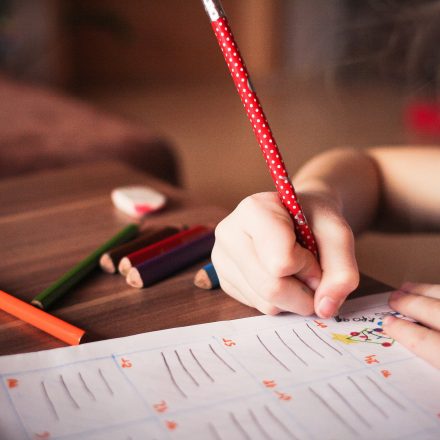La Presa Elementary serves TK-5 in the La Presa neighborhood of Spring Valley. La Presa Elementary is proud to serve our students and families with caring teachers and staff members and innovative instruction. Enroll today!
La Presa Elementary serves TK-5 in the La Presa neighborhood of Spring Valley. La Presa Elementary is proud to serve our students and families with caring teachers and staff members and innovative instruction. Enroll today!

Join La Presa Elementary PTA
PTA Link: https://jointotem.com/ca/spring-valley/la-presa-elementary-pta


Every parent wants his or her child to do well in school. The problem is not usually that parents aren't capable of helping their child do well in school. After all, not many parents have a background or training in educational techniques or child psychology. It's just that the parent doesn't know the best way to help. Here are some tips for how you can improve the likelihood of your child's school success. Remember, these techniques take both time and patience to show results – don't expect miracles overnight.
1. Teach them that learning is their 'job.'
Parents often ask what they can do to get their child interested in a particular subject or task. Lesson No. 1 is the most important lesson a child can learn about school: No one cares whether or not a child is interested in something. Of course, children learn better when they find the subject matter interesting, but what children really need to learn is that they must also learn things that they don't find particularly interesting. That's the job children have.
2. Aim high.
You don't have to be a Tiger mom, but you have to realize that parental expectations have a huge impact when it comes to student performance. If you don't expect your child to do well, your expectations will likely be met.
3. Distinguish studying from learning.
Very often a parent asks a child if the child has done his or her studying – and the child has. Not good enough! The parent needs to verify that the child has learned the lesson. Quiz the child to be sure (this gets more difficult as the child gets older and begins to take more advanced subjects). Quiz the child again on the same material a few days later, and then again a week later. What good is learning something that is forgotten a week later? Remember that employers later in life will care less about the diplomas your child has and will care more about the skills and knowledge he or she has acquired.
4. Prioritize study time.
All children need down time, and playing both alone and with other children is good for both their intellectual and social skills. However, as a matter of priority, children should, within reason, be encouraged to work first and play second. Eventually a well-developed work ethic will result in a big pay-off. Children also should have regular study hours during which to complete their schoolwork. As the child gets older, this designated study time should get longer.
5. Provide a proper homework environment.
Be sure your child has all the tools needed to do his or her best – desk, a chair, good lighting, necessary school supplies (paper, pencils, pens, calculators, computers, rulers, compasses, protractors, paper clips, note pads, etc.) and, most important, a quiet place to work.
6. Let them figure things out on their own.
Have your children think about problems at length before asking you for help. Remember that every time you tell a student an answer to a question, you have deprived that student of the opportunity to figure out the answer on his or her own. At the same time, it is appropriate to help a student who has made a legitimate, but unsuccessful, effort to learn something without assistance.
7. Teach proper reading comprehension skills.
So many children read something without remembering what they've read or understanding what it means. To aid in that gap to learning, children should know that when reading, they should not go to the next paragraph in their reading until they have understood what they have already read; if they do, they usually won't understand the next paragraph, either. You should also teach children to take notes on what they read (or, better yet, to outline what they have read). Taking notes and writing outlines reinforces what the student has learned from reading and will allow the student to be better prepared for written examinations.
8. Have them go above and beyond.
Generally, the more students practice, the more thoroughly they learn and the more they retain. Students get more practice (and more learning) if they complete all the problems and exercises in their textbooks – not just the ones the teacher assigns. Parents who want to help their children succeed should encourage their kids to do more than the minimum.
9. Make learning a four-season endeavor.
School is out in the summer, but that should not mean that children should take three months off from learning. Summer is a good time for reviewing, for learning things that may not have been taught in school (perhaps some of those chapters that were skipped in history class), for going to the library and browsing (always a good idea) and for trying to develop new intellectual skills, such as how to play games of strategy like chess, checkers or backgammon, or how to follow recipes carefully.
10. Set a good example.
Let your child see that learning doesn't end when we leave school. Model good learning behavior in the way you deal with your job and household responsibilities and let your children know that you are still learning. Parents who are still in school, perhaps pursuing a graduate degree or finally finishing up that bachelor's, can be particularly influential. If you cut class, what do you think your children will do when given the opportunity? If you have bad study habits, you can't expect your children to do better. Be sure that you show your child – through your own action – that good educational habits yield great academic rewards.
– Mark R. Solomon is the chairman of the taxation and business law department at Walsh College in Troy and counsel to the law firm of Strobl and Sharp, P.C. in Bloomfield Hills. He has about 40 years of teaching experience, including five years as a junior high school and high school mathematics teacher.

Yikes! Forgot to set the alarm? What time is it? Is it too late to get my kids to school? They will only miss one day—does that even matter?
The answer is a BIG YES!. Research shows that children put their entire school career at risk when they are absent from school, especially in the early grades. The learning they miss is hard to make up.
Okay, got it! School is important and we have to be there every day! But we have a big family and it’s hard to get out on time!
Getting many students up, dressed, and out the door on time can be a challenge. Here's are some tips to get the job done, whether you have one student or ten:
1. Sleep, sleep, sleep! Shut the TV and all screens off at least a half hour before bedtime. Lots of screen viewing makes it hard to get to sleep….which makes it hard to get up the next day.
2. Get ready the night before. Get in the habit of laying out your child’s clothes the night before. Get them to help you so that it becomes a habit. Once it does, they’ll look forward to getting up, getting dressed, and getting to school…..ON TIME!
3. Routine, Routine, Routine. Make a poster list of the things your child needs to do each day from the time they get up to the time they come home and go to bed. When it's a routine, kids tend not to argue about it.
4. Allow extra time. Set your alarm clock 10 minutes early. Snooze button? Set your clock across the room so that you have to get up and turn it off. Allow yourself an extra five or 10 minutes to get to school.
Following these simple tips will help establish a pattern of getting to school every day, on time, and eager to learn!

Your child should work independently. Encourage your child’s independent work, but provide parental support and encouragement.

Communities Putting Prevention To Work
The La Mesa-Spring Valley School District in partnership with the San Diego County Office of Education is implementing the Healthy Schools portion of the County's "Communities Putting Prevention to Work". Our district was selected as a "Pioneer" District and is implementing activities to improve physical fitness and nutrition education. The public school portion of this grant focuses on a healthy school environment with the goal being to create a school environment that promotes nutrition, physical activity, and overall student wellness throughout the school day and in before and after school programs. Specific objectives include:

Lunch applications are available in the school office. If you have applied in the past or recently applied and didn’t qualify you may apply at any time during the school year. If your household size goes up, income goes down, if you start receiving Food Stamps, FIP, FDPIR or other benefits, or if there is a job loss you should consider re-applying.